Persian Herb, Bean and Noodle Soup
Prep: 20 mins
Cook: 2 hrs 45 mins
Total: 3 hrs 5 mins
Servings: 4 to 6 Servings
Yield: 12 Cups
Aash is a Persian term used to describe a family of nearly 50 varieties of thick soup that generally combine beans, grains, large quantities of herbs, spices, and sometimes noodles and meat. Aash, pronounced “Osh”, can also be spelled Ash, Aash, or Aush.
To fully understand the significance of Aash in Persian cuisine, we need to have a little bit of a Farsi lesson. In old spoken Farsi, the word Aash referred to any prepared food, not just to this thick soup. Today in modern Farsi, all terms for cooking, the chef, and the kitchen are derivatives of the old word Aash. Aash-Pazi means cooking, Aash-Paz references the chef, and Aash-Paz-Khaneh is the word for the kitchen, the room where the Aash is cooked.
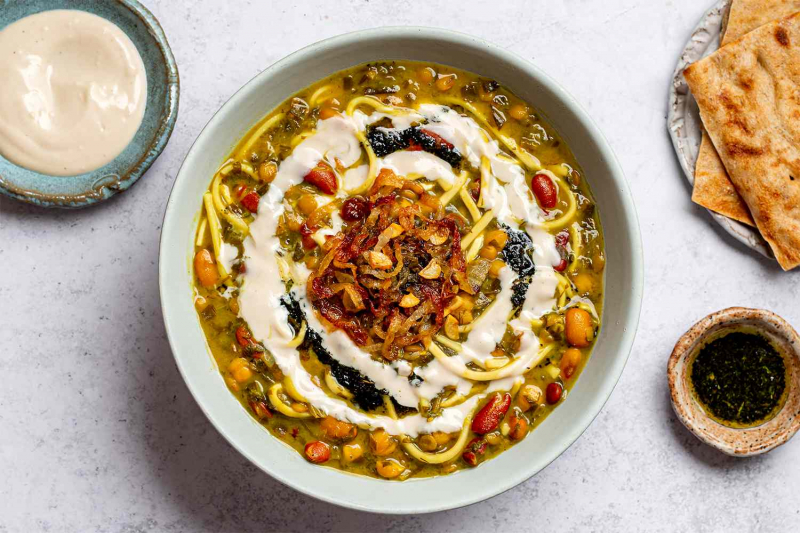
Aash Reshteh – with “Reshteh” referring to a particular type of noodle – is one of the most well-loved members of the Aash family. It is a satisfying, hearty, and stick-to-your-ribs kind of meal with a deep savory flavor profile. Aash Reshteh is often served around Persian New Year – known as Nowruz – and for various religious holidays. The noodles are highly symbolic, representing life’s journey and all the forms and shapes it takes. Eating this soup during the Nowruz celebration highlights how one anticipates the journey ahead while the noodles embody good fortune for the new year.
At first glance, you will notice the long list of ingredients for this soup, accounting for the depth and complexity of its flavors. However, don’t let the list of ingredients deter you from giving this recipe a try, as just about every ingredient is readily available and quite easy on the wallet.
As with most Persian dishes, Aash Reshteh is best served about 10 minutes after it has finished cooking and the Aash has had a chance to “set”. Traditionally, Aash is accompanied by naan sangak, a Persian sourdough-based flatbread that is cooked on hot pebbles, but it can be served with any flatbread of your choice such as pita or naan.
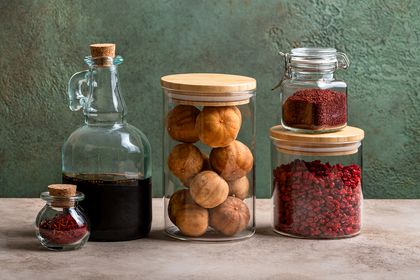
“I am a huge fan of Aash Reshteh and this recipe did not disappoint! When preparing the herbs, make sure you use a very sharp knife. I also recommend trying Aash with pomegranate molasses. Just add a tablespoon or two to your bowl for a unique, tangy flavor!”—Bahareh Niati
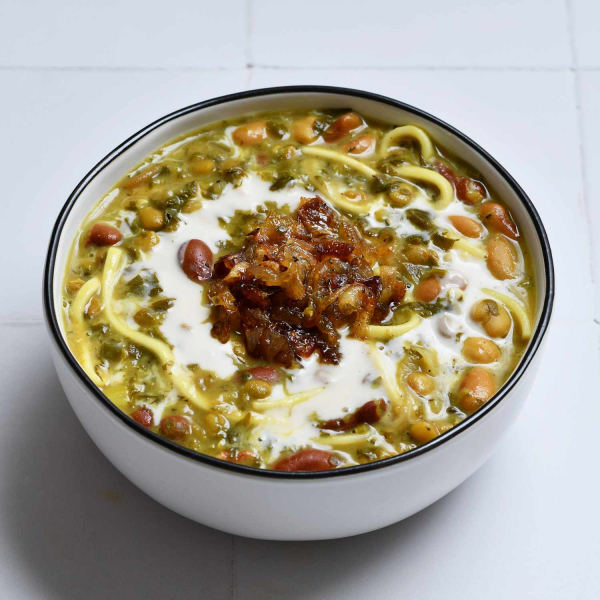
A Note From Our Recipe Tester
Ingredients
For The Soup:
-
2 tablespoons olive oil
-
1 large yellow onion, diced
-
1 teaspoon ground turmeric
-
1/3 cup dried pinto beans, soaked overnight
-
1/3 cup dried red kidney beans, soaked overnight
-
1/3 cup dried garbanzo beans, soaked overnight
-
9 cups water
-
1/2 cup dried green lentils
-
1 1/2 teaspoons fine sea salt, or to taste
-
1/2 teaspoon freshly ground black pepper
-
1 cup coarsely chopped fresh parsley
-
1 cup coarsely chopped fresh cilantro
-
1/2 cup coarsely chopped fresh dill
-
2 cups coarsely chopped fresh spinach
-
6 medium green onions, finely chopped
-
1/4 cup freshly squeezed lemon juice
-
8 ounces linguine, broken in half
-
1 cup Kashk (Persian whey sauce) mixed with 1/4 cup water, or substitute sour cream
For The Toppings:
-
6 tablespoons olive oil, divided
-
1 large yellow onion, thinly sliced
-
1/4 teaspoon fine sea salt
-
6 cloves garlic, thinly sliced
-
2 tablespoons dried mint
-
2 tablespoons Kashk mixed with 1 tablespoon water, or substitute sour cream
Steps to Make It
Make The Soup
-
Gather the soup ingredients.
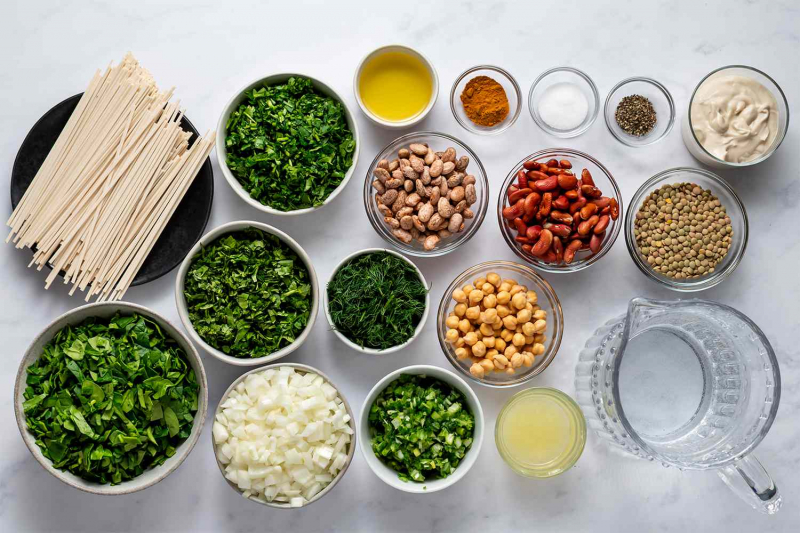
-
In a large Dutch oven or other heavy-duty pot, heat the oil on medium heat until it shimmers. Add the onion and saute, stirring continuously, until aromatic and lightly golden, about 15 minutes.
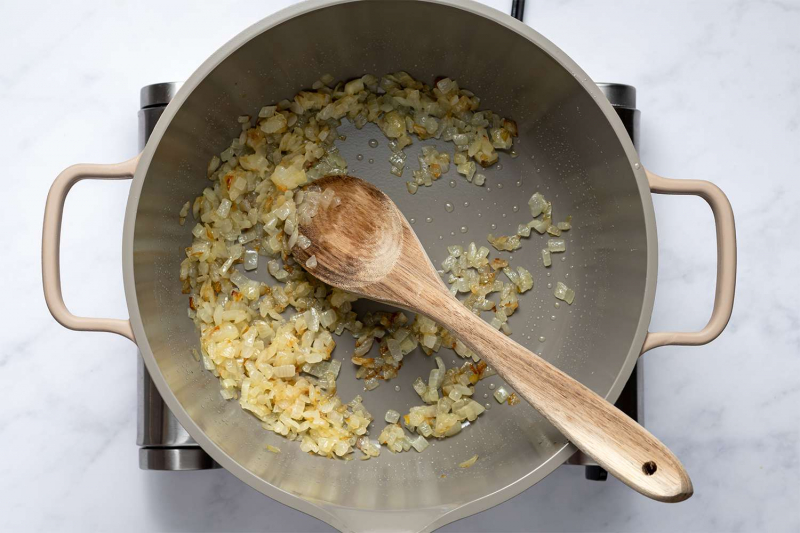
-
Add the turmeric and saute for a couple of minutes before adding the pinto beans, kidney beans, and garbanzo beans.
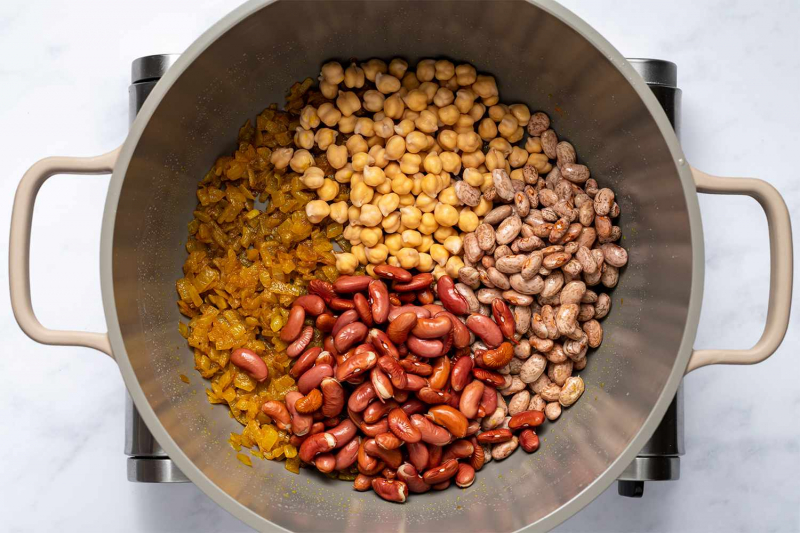
-
Add the water, raise the heat to high and bring to a boil. Reduce the heat to low, cover, and cook until the beans begin to turn tender, about 60 minutes.
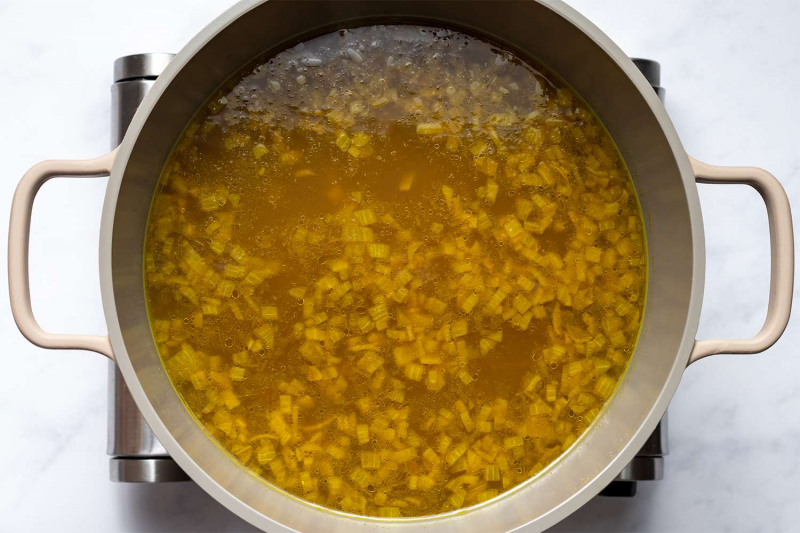
-
Add the lentils, salt, and pepper, and continue to cook over low heat until the beans and lentils are tender, about 30 minutes more.
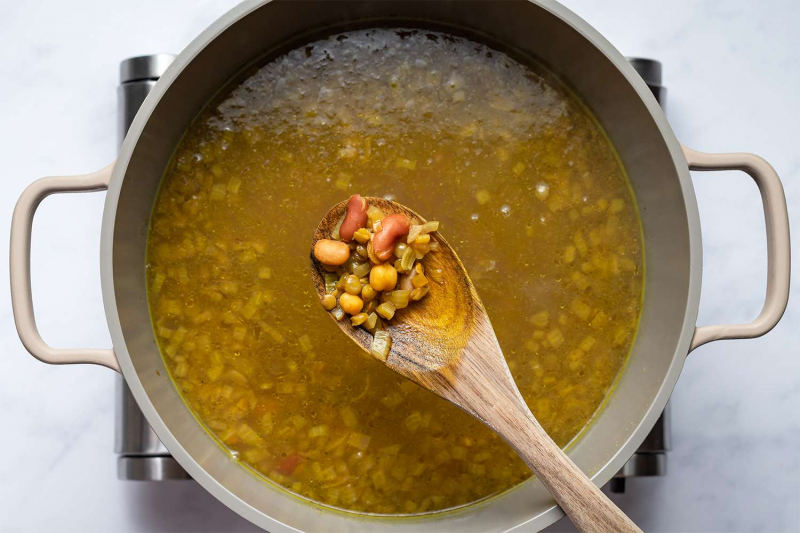
-
Add the parsley, cilantro, dill, spinach, green onions, and lemon juice. Gently stir until everything is well combined in the pot.
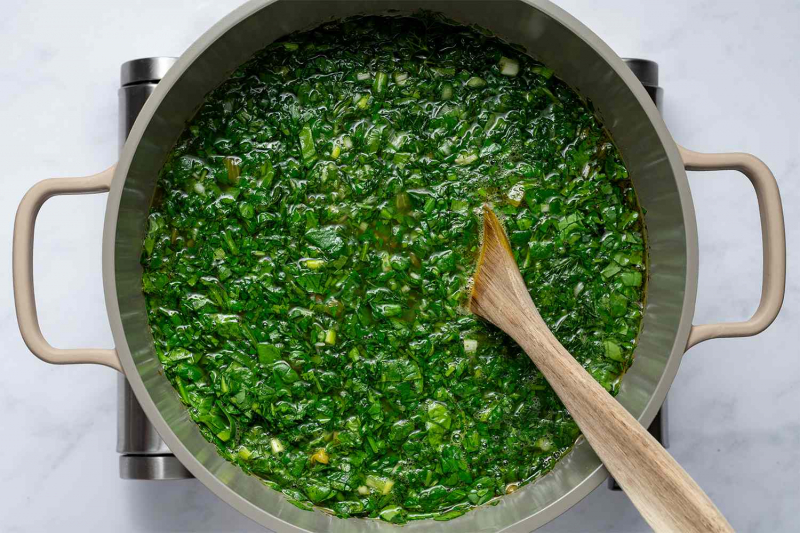
-
Cover, and cook on low heat for 30 minutes. The soup will be dense with ingredients and the consistency should resemble a thick soup at this stage.
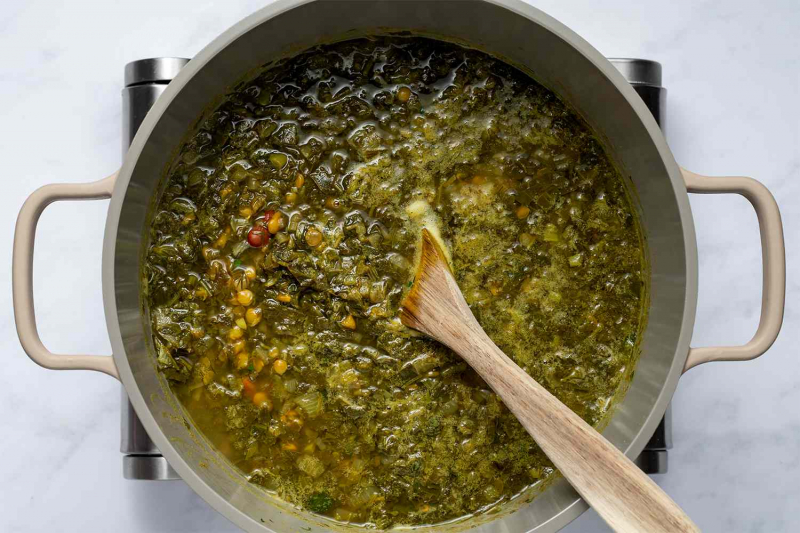
-
Add the noodles, gently stirring them into the soup. Cover and cook on low heat until the noodles are al dente, about 10 minutes. Stir occasionally during cooking to make sure nothing is sticking to the bottom of the pan.
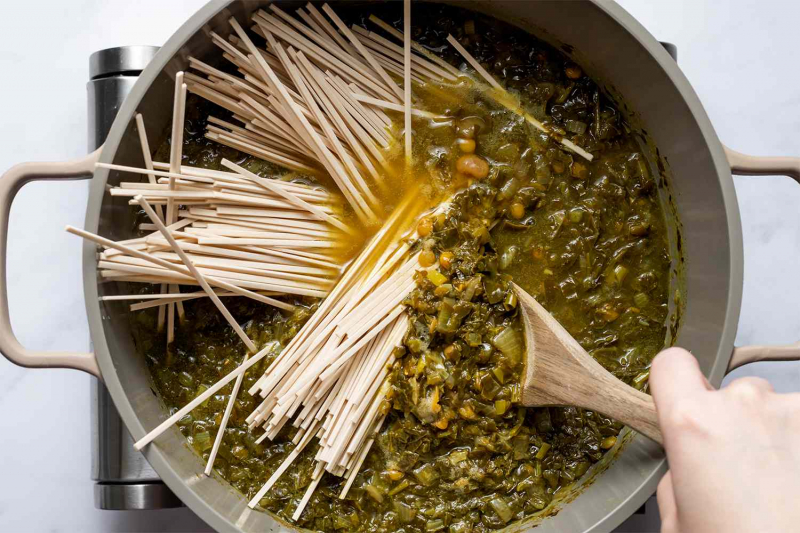
-
Add the Kashk (or sour cream) and stir until it is fully integrated into the soup.
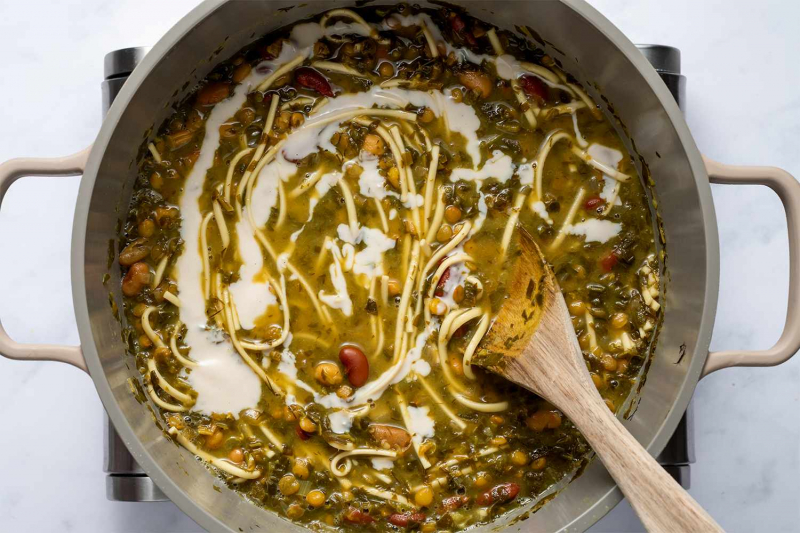
-
Turn off the heat and allow the Aash to sit for 10 minutes before serving with the toppings.
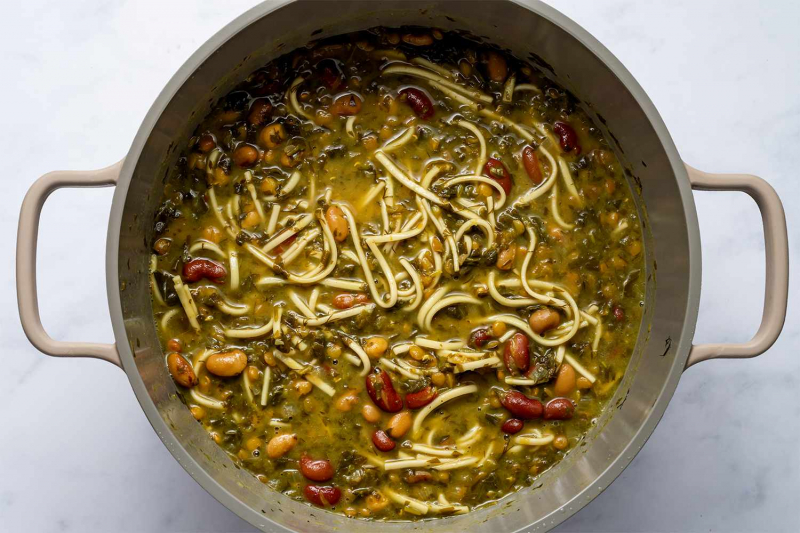
Prepare The Toppings
-
Gather the toppings ingredients to prepare while the soup is cooking.
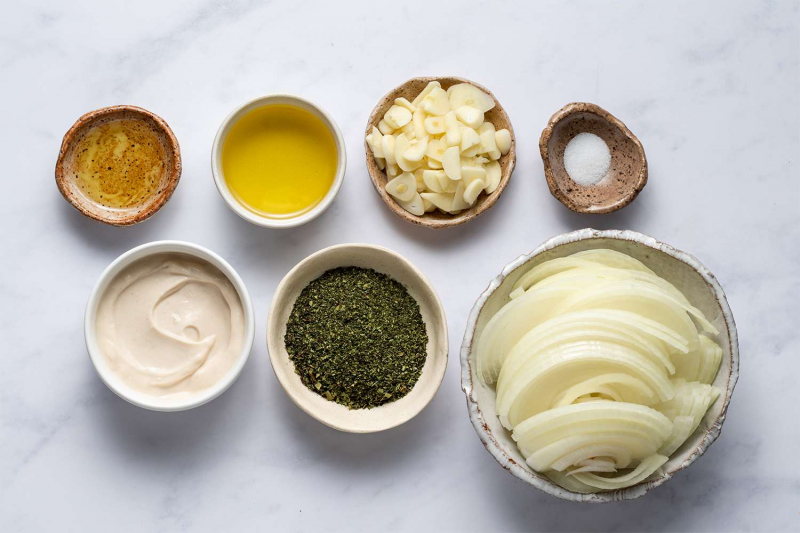
-
Heat 1 tablespoon of the olive oil in a medium skillet over medium heat until it shimmers. Add the onions and saute, stirring constantly until light golden, 15 to 20 minutes.
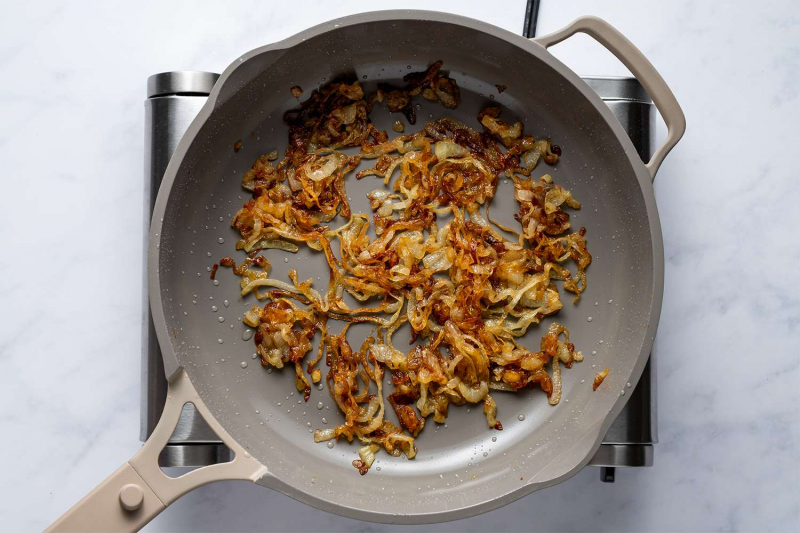
-
Stir in the salt and transfer to a small heat-proof bowl. Set aside.
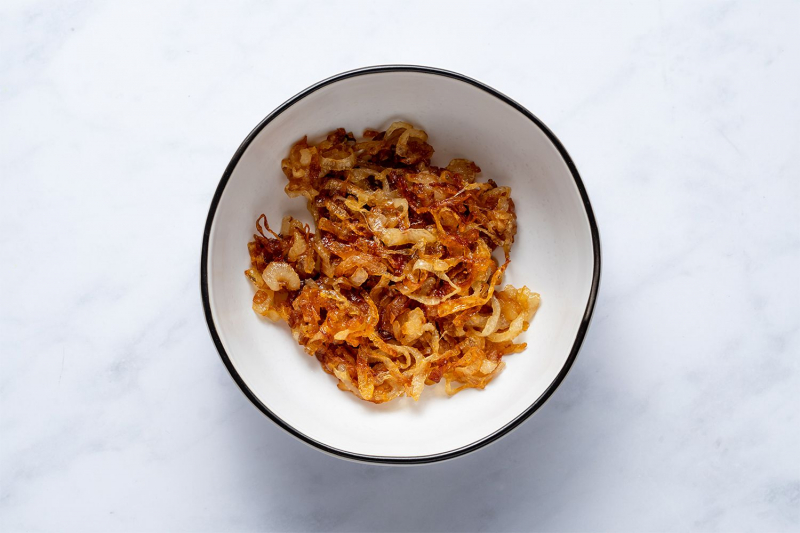
-
Lower the heat to low. Add the 2 tablespoons of olive oil to the same skillet. Add the garlic and saute until golden and aromatic, taking care not to burn the garlic, about 1 minute.
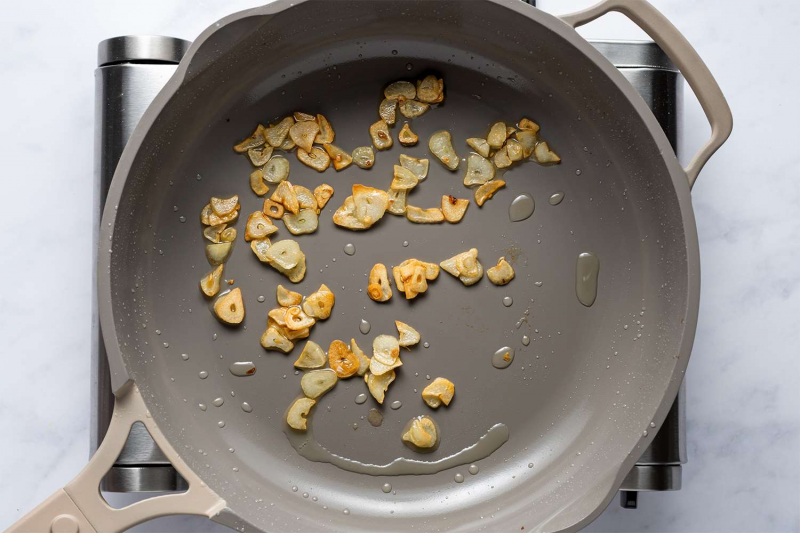
-
Using a fork or a slotted spoon, remove the garlic from the pan and add it to the bowl with onions.
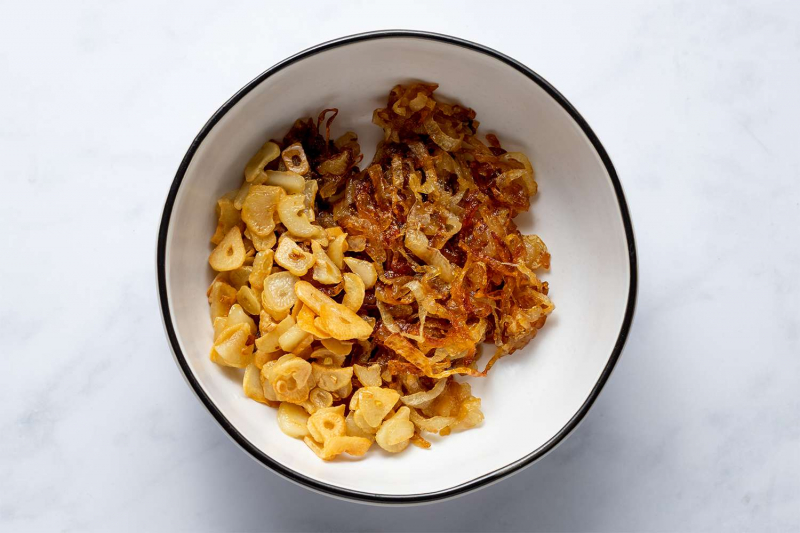
-
Add the remaining 3 tablespoons of oil to the same skillet. Add the dried mint, stirring constantly until just combined, about 30 seconds. Transfer to the bowl with the onion and garlic mixture, stirring to combine.
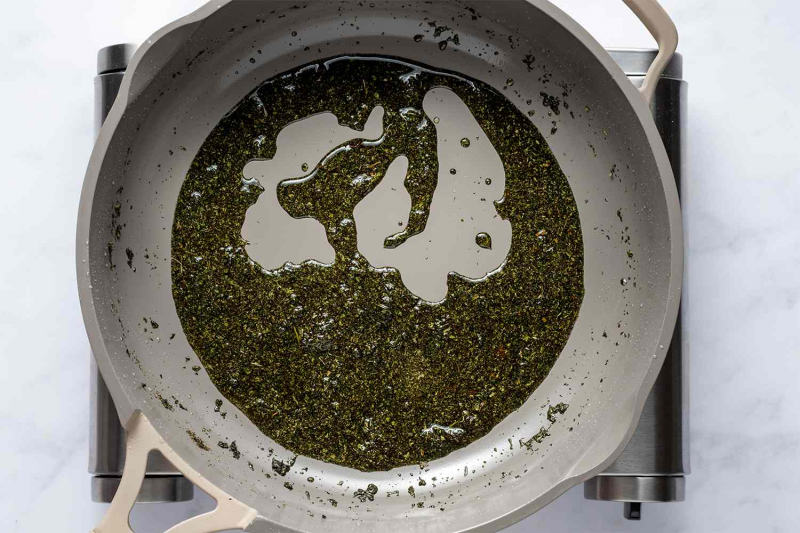
-
Serve the Aash in a soup bowl, garnish with the Kashk (or sour cream) topping, and the onion-garlic-mint topping,
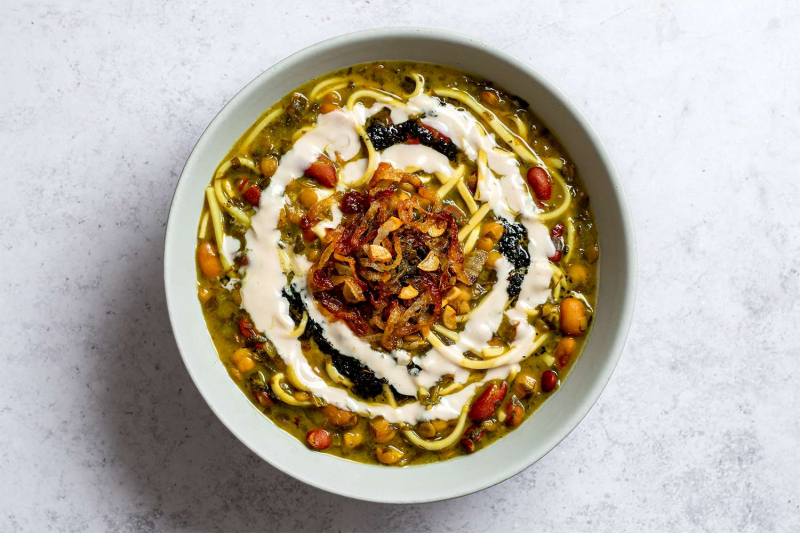
Recipe Tips
- Reshteh can be purchased at local Persian and/or Middle Eastern markets or through various online Persian retailers. Otherwise, you may easily substitute them with readily-available linguine.
- Kashk is often referred to as liquid whey in English, but that is not really an accurate term. Whey is the liquid left behind after milk has been curdled and strained, mostly in yogurt or cheese manufacturing, while kashk is the actual curds from cooking the yogurt.
- Kashk is found in the refrigerated section of your local Persian and/or Middle Eastern market. It comes in both freshly prepared and dried forms, but I always prefer to use the freshly prepared version over the dried form. Kashk by nature delivers a strong and bold flavor profile (salty and sour), and it can easily be replaced by using sour cream or a tangy greek yogurt.
Recipe Variations
- Good quality canned beans can be substituted for the dried beans, significantly cutting down on the cooking time for this soup, by nearly 1 hour. The beans are first strained and rinsed with water and added right after sauteing the onions with turmeric at step 3. Alternatively, dried beans can also be cooked ahead of time in a slow cooker or an Instant Pot.
- While fresh herbs are preferred for this soup, the use of dried herbs is also quite customary in Persian cuisine. A general rule of thumb for swapping dried herbs for fresh ones is to use about one-third of the quantity of fresh herbs. So if the recipe asks for 1 cup fresh, you would need 1/3 cup dried. The dried herbs are typically soaked in water for 15 minutes before being strained through a fine-mesh strainer and added to the aash.
Storage and Freezing
- Much like many other soups and stews, aash will continue to improve in flavor and texture as it sits in the fridge overnight. Leftover aash can be placed in an airtight container and stored in the fridge for up to 3 days. However, it is best to leave off the topping and store that separately. When reheating, add a small amount of water to adjust the consistency of the soup.
- Aash reshteh is also a great dish for freezing. Given the cooking time, I sometimes make a larger batch, so that I can have some for when I crave this soup but don’t have the time to prepare it. Once the aash reshteh is cooked, place it in an airtight freezer-safe dish without the topping, cover, and leave it in the fridge overnight. Once completely cooled, the dish can be moved to the freezer and stored for up to 2 months.
- To thaw, remove the frozen aash from the freezer and place it in the refrigerator overnight. The aash will be mostly thawed at this stage. Place the aash in an appropriately sized pan, add a touch more water to adjust the consistency, and heat, covered, over medium-low heat until it is nice and hot. Avoid excessive stirring so that the noodles remain intact. While the aash is gently simmering, a new batch of the topping can be prepared.
| Nutrition Facts | |
|---|---|
| Servings: 4 to 6 | |
| Amount per serving | |
| Calories | 404 |
| % Daily Value* | |
| Total Fat 27g | 35% |
| Saturated Fat 7g | 35% |
| Cholesterol 25mg | 8% |
| Sodium 668mg | 29% |
| Total Carbohydrate 33g | 12% |
| Dietary Fiber 6g | 22% |
| Total Sugars 5g | |
| Protein 9g | |
| Vitamin C 28mg | 142% |
| Calcium 135mg | 10% |
| Iron 4mg | 22% |
| Potassium 526mg | 11% |
| *The % Daily Value (DV) tells you how much a nutrient in a food serving contributes to a daily diet. 2,000 calories a day is used for general nutrition advice. | |
